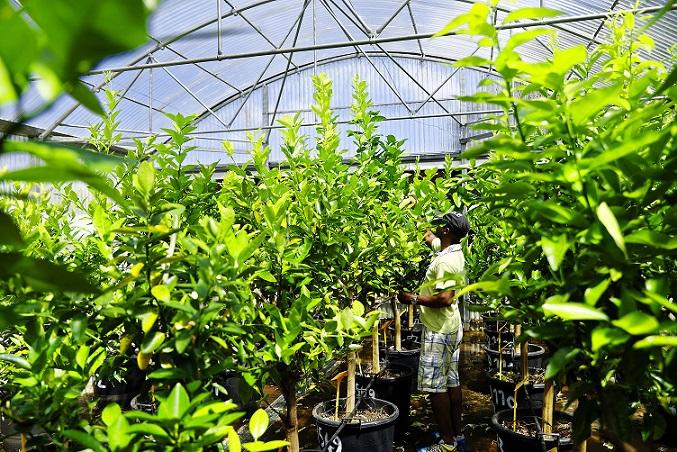- Home
- Worldwide
- CIRAD worldwide
- Projects
- BSV 1 project
Biodiversity and Plant Health - Epidemiological surveillance, molecular epidemiology and environmental adaptation - BSV 1

Production of citrus plants according to the CAC standard © R.Carayol, CIRAD
Issues
Agriculture in the French overseas departments is part of a fragile environment that must be protected from the introduction of new pests. Productivity, in terms of both quantity and quality, partly depends on the health status of raw materials and the control methods used. At any point in a plant production chain, it is essential to ensure early detection of pests using a set of sensitive, discriminant methods.
Several diagnostic methods already exist, such as conventional PCR and qPCR, but there are currently no validated methods that are easy to deploy directly in the field.
Description
The project is implemented within the 3P platform, which hosts teams that are actively involved in diagnosis (teams from CIRAD, the Plant Health Laboratory at ANSES, and the Plant Clinic at FDGDON). The project is designed to develop molecular diagnostic tools that are directly usable outside, on site, for diagnoses made directly in the field. These methods, based on PCR procedures or even molecular hybridisation, are developed to detect and identify pathogenic quarantine organisms that are of community interest and have a high incidence in Reunion Island. Isothermal methods such as LAMP (Loop-mediated isothermal amplification) and RPA (recombinase polymerase amplification) have been developed for plant health, but are now also expanding rapidly in the field of human and animal health.
The development of these new techniques has enabled one of the project teams to identify copper resistance in bacteria responsible for citrus canker, a major disease of citrus fruit, in Reunion Island.
Expected changes
New diagnostic tools will be implemented and epidemiological surveillance will be improved by them, for Xanthomonas citri pv. citri in citrus fruits, for the Ralstonia solanacearum species complex in Solanaceae, and for Fusarium oxysporum f. sp. Cubense race 4 in banana plants.
As regards X. citri pv. citri, the sector will focus on:
- The certification of citrus plants in nurseries in Reunion Island and the implementation of the European CAC standard,
- The controlled introduction and monitoring of new citrus varieties in Reunion Island that are of greater agronomic interest,
- The facilitated, rigorous, precise and extended monitoring of plant material exchange in the Indian Ocean region,
- The facilitated localisation and surveillance of copper-resistant bacterial populations.
As regards the Ralstonia solanacearum species complex:
- The development of LAMP protocols, in other words tools to enable rapid diagnosis of this bacteria in the field or in greenhouses.
- The surveillance and monitoring of the most prevalent bacterial populations in the Indian Ocean region.
Expected impacts
- Providing the means to prevent pathogens through rapid diagnosis in the field will enable effective implementation of targeted measures to control these pathogens that will be shared with the different actors concerned.
- The reduction in losses caused by these organisms thanks to new early detection methods will increase local yields and the quantities available on markets.
- Competitive farming systems based on an agroecological approach will be fostered.
Contract partners
Local partners:
- University of Reunion Island
- ANSES/LSV
- FDGDON
- ARMEFLHOR
- Chamber of Agriculture
National partners:
- ANSES
- INRAE
- CNRS
- INRIA
- Partner research units of Labex Agro (Montpellier)
International partners:
- University of Cape Town (South Africa)
- University and FAREI (Mauritius)
- University of Canterbury (New Zealand)
- University of Wisconsin (USA)
- University of Tübingen (Germany)
- Seychelles Agricultural Agency
- University and INRAPE (Comoros)
- International Institute of Tropical Agriculture (Kenya-Tanzanie)
- International Potato Center (Kenya)
- Centre National de la Recherche Appliquée au Développement Rural (FOFIFA, Madagascar)
























